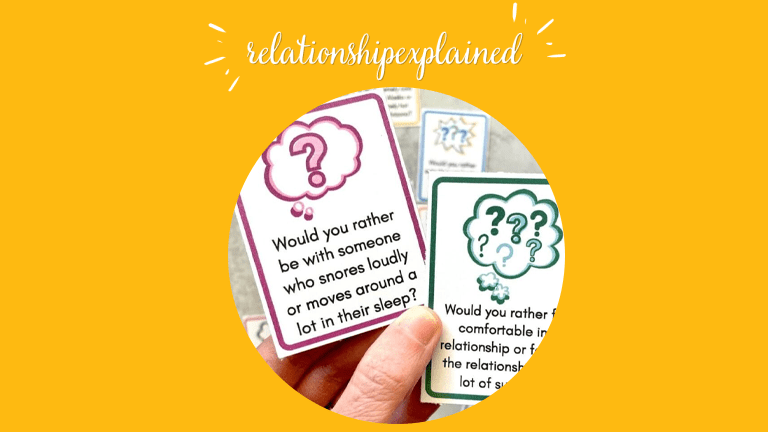Couples Communication Exercises
Struggling to maintain open and effective communication with your partner? Communication challenges are common in relationships but can lead to misunderstandings and conflict if not addressed. Couples communication exercises are designed to break down barriers, enhance understanding, and foster a deeper connection between partners. Well, we'll be going over: Let's dive in. Key Takeaways Understanding […]
Struggling to maintain open and effective communication with your partner?
Communication challenges are common in relationships but can lead to misunderstandings and conflict if not addressed. Couples communication exercises are designed to break down barriers, enhance understanding, and foster a deeper connection between partners.
Well, we'll be going over:
- How can active listening exercises transform the way you communicate with your partner?
- What role do emotional expression exercises play in fostering understanding and empathy?
- In what ways can conflict resolution exercises help you navigate disagreements more constructively?
Let's dive in.
Key Takeaways
- Couples communication exercises can help improve communication in your relationship and enhance intimacy and trust.
- Understanding the basics of communication, practicing active listening techniques, and developing conflict resolution strategies are key components of effective couples communication exercises.
- By improving your communication skills, you can strengthen your connection with your partner and build a happier, healthier relationship.
Understanding the Basics of Communication in Relationships
Communication is the foundation of any healthy relationship, and it is essential to understand the basics of communication in relationships. In this section, we will discuss the importance of communication and the different communication skills and styles that are necessary for a healthy relationship.
The Importance of Communication
Communication is the key to a healthy relationship. It is the process of exchanging thoughts, ideas, and feelings with your partner. Effective communication helps build trust, respect, and understanding between partners. It also helps resolve conflicts and prevents misunderstandings.
In a relationship, communication is essential to express your needs and desires, share your thoughts and feelings, and understand your partner's perspective. It helps create a sense of intimacy and emotional connection between partners.
Communication Skills and Styles
Effective communication requires specific skills and styles. Communication skills include active listening, assertiveness, empathy, and problem-solving. Active listening means paying attention to your partner, understanding their perspective, and responding appropriately. Assertiveness means expressing your needs and desires without being aggressive or passive. Empathy means understanding your partner's feelings and perspective. Problem-solving means working together to find a solution that works for both partners.
Communication styles refer to the way you communicate with your partner. There are four primary communication styles: passive, aggressive, passive-aggressive, and assertive. Passive communication means avoiding conflict and not expressing your needs and desires. Aggressive communication means expressing your needs and desires in a way that disregards your partner's feelings. Passive-aggressive communication means expressing your needs and desires indirectly. Assertive communication means expressing your needs and desires in a way that respects your partner's feelings.
In conclusion, effective communication is essential to a healthy relationship. It requires specific skills and styles, including active listening, assertiveness, empathy, and problem-solving. Understanding these basics of communication in relationships can help you build a strong emotional connection with your partner and prevent misunderstandings and conflicts.
Active Listening Techniques for Couples
Communication is the key to a successful relationship, and active listening is an essential component of communication. Active listening means fully concentrating on what your partner is saying and trying to understand their message. It involves paying attention to both verbal and nonverbal cues, such as tone of voice and body language.
Principles of Active Listening
Active listening involves several principles that can help you become a better listener. These principles include:
-
Focus on your partner: Give your partner your full attention and avoid distractions. This means putting away your phone and other devices and focusing solely on your partner.
-
Show empathy: Try to understand your partner's perspective and feelings. Show empathy by acknowledging their emotions and validating their experiences.
-
Ask questions: Ask open-ended questions to encourage your partner to share more information. This will help you gain a better understanding of their thoughts and feelings.
-
Reflect back: Summarize what your partner has said to show that you are listening and to ensure that you understand their message.
-
Avoid interrupting: Interrupting your partner can be frustrating and disrespectful. Wait for them to finish speaking before responding.
Active Listening Exercises
There are several active listening exercises that couples can practice to improve their communication skills. These exercises include:
-
Mirroring: One partner speaks while the other partner listens. The listener then repeats back what they heard to ensure that they understood the message correctly.
-
Paraphrasing: One partner speaks while the other partner listens. The listener then summarizes what they heard in their own words to ensure that they understood the message correctly.
-
Summarizing: One partner speaks while the other partner listens. The listener then summarizes the main points of the message to ensure that they understood the message correctly.
-
Role-playing: Couples can practice active listening by role-playing different scenarios. For example, one partner can pretend to be upset while the other partner practices active listening skills.
By practicing active listening techniques and exercises, couples can improve their communication skills and strengthen their relationship. Remember to focus on your partner, show empathy, ask questions, reflect back, and avoid interrupting.
Expressing and Managing Emotions
Communication is the key to a successful relationship, and one of the most important aspects of communication is expressing and managing emotions. Couples communication exercises can help you and your partner identify and share your feelings in a healthy and productive way, and develop the skills needed to regulate your emotions in a romantic relationship.
Identifying and Sharing Feelings
Identifying and sharing your feelings with your partner is essential for building a strong emotional bond and deepening your intimacy. When you share your feelings, it helps your partner understand your perspective and empathize with you. It also helps you feel heard and validated.
To identify and share your feelings effectively, try the following exercises:
-
Feeling Check-In: Take turns sharing how you're feeling at the moment, without judgment or criticism. Use "I" statements to express your emotions, such as "I feel frustrated when..." or "I'm feeling happy because..."
-
Emotion Word List: Use an emotion word list to help you identify and express your feelings. This can be especially helpful if you're struggling to find the right words to describe how you're feeling.
Emotion Regulation in a Romantic Relationship
Emotion regulation is the process of managing your emotions in a healthy and productive way. In a romantic relationship, it's important to regulate your emotions to avoid conflicts and maintain a strong bond with your partner.
To regulate your emotions effectively, try the following exercises:
-
Mindful Breathing: Take a few deep breaths and focus on your breath as it enters and leaves your body. This can help you feel more calm and centered, and reduce the intensity of your emotions.
-
Positive Self-Talk: Use positive self-talk to help you manage your emotions. For example, if you're feeling anxious, you might say to yourself, "I can handle this. Everything will be okay."
By practicing these couples communication exercises, you and your partner can develop the skills needed to express and manage your emotions in a healthy and productive way, and build a stronger, more intimate bond.
Conflict Resolution Strategies
When conflicts arise in a relationship, it's important to have effective communication and conflict resolution strategies in place. Here are a few exercises that can help you navigate conflicts and misunderstandings and communicate more effectively during conflict.
Navigating Conflicts and Misunderstandings
-
Active Listening: When your partner is speaking, make sure you're actively listening to what they're saying. This means giving them your full attention, making eye contact, and avoiding interrupting them. Once they've finished speaking, repeat back what you heard to make sure you understood them correctly.
-
"I" Statements: When discussing a problem, try to use "I" statements instead of "you" statements. For example, instead of saying "You never listen to me," say "I feel like I'm not being heard when we have conversations." This helps avoid placing blame and keeps the focus on your feelings and needs.
-
Compromise: When working through a conflict, it's important to find a compromise that works for both partners. This means being willing to give a little and finding a solution that meets both of your needs.
Effective Communication During Conflict
-
Take a Break: If you feel yourself getting too emotional during a conflict, take a break to cool down. This can help prevent the conversation from escalating and give you time to gather your thoughts.
-
Stay Focused: During a conflict, it's important to stay focused on the issue at hand. Avoid bringing up past conflicts or unrelated issues, as this can make it harder to find a resolution.
-
Use "I" Statements: As mentioned earlier, using "I" statements can help keep the conversation focused on your feelings and needs. This can help prevent the conversation from becoming accusatory or confrontational.
By practicing these exercises, you can develop healthy communication habits and improve your conflict resolution skills. Remember, conflict is a normal part of any relationship, and learning how to navigate it effectively can help strengthen your bond with your partner.
Enhancing Intimacy and Trust Through Communication
Communication is the foundation of any successful relationship. It is through communication that couples can establish trust, deepen intimacy, and build a fulfilling relationship. In this section, we will discuss some effective communication exercises for couples that can help enhance intimacy and trust.
Building Trust with Communication Exercises
Trust is essential for any relationship to thrive. Couples can build trust by engaging in communication exercises that promote transparency and vulnerability. One such exercise is the "Truth Circle," where couples take turns asking and answering questions honestly. This exercise can help build trust by promoting open and honest communication.
Another trust-building exercise is the "Appreciation Game," where couples take turns expressing gratitude for each other. This exercise can help build trust by promoting positive communication and highlighting the positive aspects of the relationship.
Deepening Intimacy with Shared Activities
Intimacy is another crucial aspect of a fulfilling relationship. Couples can deepen intimacy by engaging in shared activities that promote bonding and connection. One such activity is the "Intimacy Jar," where couples take turns pulling out slips of paper with intimate activities written on them. This exercise can help deepen intimacy by promoting shared experiences and exploring new ways to connect.
Another intimacy-building exercise is the "Love Map," where couples take turns asking and answering questions about each other's likes, dislikes, hopes, and dreams. This exercise can help deepen intimacy by promoting understanding and empathy.
In conclusion, effective communication exercises for couples can help enhance intimacy and trust, two crucial components of a fulfilling relationship. By engaging in trust-building exercises and shared activities that promote bonding, couples can establish a strong foundation for a healthy and fulfilling relationship.
Frequently Asked Questions
What are some effective exercises to enhance communication in relationships?
Communication is the key to any healthy relationship. There are several exercises that couples can do to enhance their communication skills. One effective exercise is active listening. This involves listening to your partner without interrupting them and then repeating back what you heard to ensure that you understood them correctly. Another exercise is the "I" statement exercise, where you express your feelings using "I" statements instead of "you" statements. This can help to avoid blame and defensiveness.
Can you recommend any communication strategies for couples in therapy?
Couples in therapy can benefit from several communication strategies. One effective strategy is to practice assertive communication. This involves expressing your needs and feelings in a clear and direct way without being aggressive or passive. Another strategy is to use reflective listening, where you listen to your partner and then reflect back what you heard to ensure that you understood them correctly. This can help to build empathy and understanding between partners.
How can couples use validation exercises to improve their communication?
Validation exercises can be a powerful tool for improving communication in relationships. One effective exercise is to practice active validation, where you listen to your partner and then validate their feelings by acknowledging them and showing empathy. Another exercise is to practice self-validation, where you validate your own feelings and needs instead of seeking validation from your partner. This can help to reduce conflict and build trust in the relationship.
What are some communication exercises found in couples therapy workbooks?
There are several communication exercises found in couples therapy workbooks. One popular workbook is the "Couples Therapy Workbook" by Kathleen Mates-Youngman. This workbook contains several exercises such as the "Love Map" exercise, where couples ask each other questions to learn more about each other, and the "Dreams Within Conflict" exercise, where couples identify their underlying dreams and values in conflict situations. Another workbook is the "Couple's Communication Made Easy" by Matthew McKay, which contains several exercises such as the "Active Listening" exercise and the "I-Message" exercise.
In what ways can Christian communication exercises benefit couples?
Christian communication exercises can benefit couples by incorporating spiritual principles into their communication. One effective exercise is to practice prayer together, where couples pray for each other and their relationship. Another exercise is to practice forgiveness, where couples forgive each other for past hurts and mistakes. This can help to build trust and strengthen the bond between partners.
What techniques can help repair and strengthen communication after a breakdown in a relationship?
After a breakdown in a relationship, it can be difficult to repair and strengthen communication. One effective technique is to practice active listening and empathy, where you listen to your partner and show understanding and compassion for their feelings. Another technique is to practice forgiveness, where you let go of past hurts and focus on moving forward. Additionally, practicing effective communication skills such as using "I" statements and avoiding blame can help to rebuild trust and strengthen the relationship.












